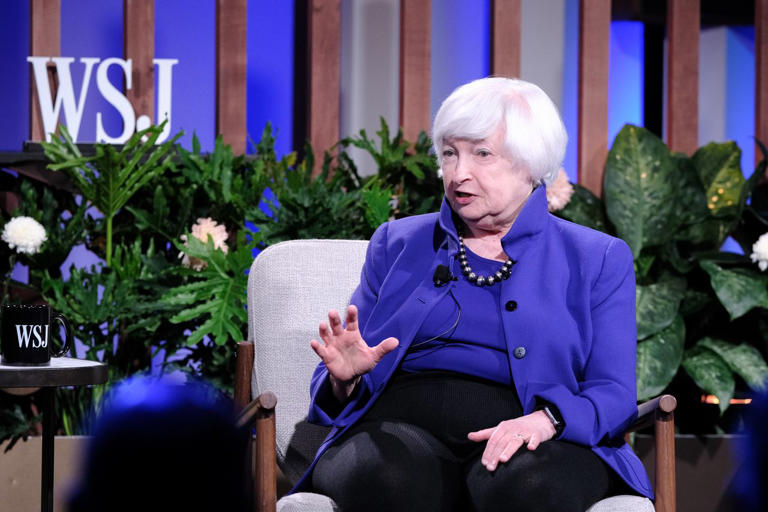
WASHINGTON—Treasury Secretary Janet Yellen said the U.S. economy is on the path toward taming inflation without a deep economic slowdown, achieving a so-called soft landing.
“To me a soft landing is the economy continues to grow, the labor market remains strong and inflation comes down. And I believe that’s the path we’re on,” Yellen said Tuesday at The Wall Street Journal’s CEO Council Summit.
Yellen spoke soon after monthly Labor Department data showed inflation holding nearly steady, with the consumer-price index rising 3.1% in November from a year earlier. That is a slight slowdown from the 3.2% reading in October.
Economists for months have debated whether a soft landing for the U.S. economy was possible. Earlier in the year, the consensus among economists surveyed by the Journal was that the economy would enter a recession, though those expectations faded over time.
Yellen, a former academic economist and chair of the Federal Reserve, said that the data show that inflation is falling toward the Fed’s 2% target and that it doesn’t appear that the final stretch toward that marker will be painful for Americans.
“It’s certainly meaningfully coming down. And I see no reason, on the path that we’re currently on, why inflation shouldn’t gradually decline to levels that are consistent with the Fed’s mandate and targets,” she said. “I personally don’t see any good reason to think that the last mile is going to be especially difficult.”
She said Americans don’t expect inflation to persist, helping the U.S. economy to smoothly slow price increases. In previous inflation episodes, Americans expected higher prices, forcing the Fed to hold interest rates high enough to cause job losses in order to bring inflation down.
“Because inflation expectations had never meaningfully ratcheted up on a long-term basis, we just had to have the economy normalize and get the labor market back to a sort of full employment state to bring inflation down,” she said.
Asked if the progress on bringing down inflation could prompt the Fed to start cutting rates from a 22-year high range of between 5.25% and 5.5%, Yellen declined to comment on how the central bank should proceed. But she said that falling inflation means real interest rates, which are adjusted for inflation, are rising even as the Fed holds nominal rates steady.
“Of course, as inflation comes down, other things equal, real interest rates tend to rise, which causes a tightening of monetary policy in a sense. So that’s one factor that could weigh in a decision that the Fed makes about the path of interest rates,” she said.
Even as the U.S. economy remains solid, many Americans have a sour view of it, a challenge for the Biden administration ahead of the 2024 election. Yellen said the discontent was because of the stresses of the pandemic, as well as the fact that many prices remain elevated even if they are rising at a slower rate.
“We’re trying to take the steps we can to address these prices,” she said, pointing to the administration’s legislative accomplishments.
Yellen also said that higher interest rates were putting pressure on the federal government’s budget by raising the cost of borrowing. She said the Biden administration’s proposed plans for raising tax revenue, many of which Congress has rejected, could help put the U.S. on a more sustainable fiscal path. She also said spending on Social Security and Medicare is projected to increase, which will need to be addressed.


